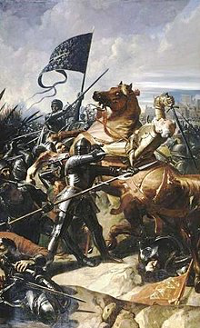The Hundred Years War
Part 7: The War Ends
French advances continued. France retook Rouen and consolidated its hold on Normandy. France besieged the Gascony capital, Bordeaux, on June 30, 1451, only to lose it the following October. Another French victory followed, at the Battle of Castillon (above), in July of 1453. That was officially the last battle of the war. England still controlled Calais, but that was the extent of its French possessions. English discontent at home ended the war and played a large part in the development of a new, internal war, the Wars of the Roses, two years later. The war officially ended in 1474, when the two countries signed a treaty and then-King Edward IV renounced his claim to the French throne. First page > The Early Years > Page 1, 2, 3, 4, 5, 6, 7
|
|
Social Studies for Kids
copyright 2002–2026
David White



 The length of the war began to take its toll on English fortunes. France continued to have superior numbers and to have the advantage of fighting on and for home soil. As well, the new French king made the most of his father's ambitions to develop a modernized army, spearheaded by the advent of the dominance of French artillery. What started out as an army add-on became, during the course of the war, a difference-maker in pitched field battles and in sieges. This resulted in the first regular standing army in Western Europe since the end of the Roman Empire, about a century earlier.
The length of the war began to take its toll on English fortunes. France continued to have superior numbers and to have the advantage of fighting on and for home soil. As well, the new French king made the most of his father's ambitions to develop a modernized army, spearheaded by the advent of the dominance of French artillery. What started out as an army add-on became, during the course of the war, a difference-maker in pitched field battles and in sieges. This resulted in the first regular standing army in Western Europe since the end of the Roman Empire, about a century earlier.
